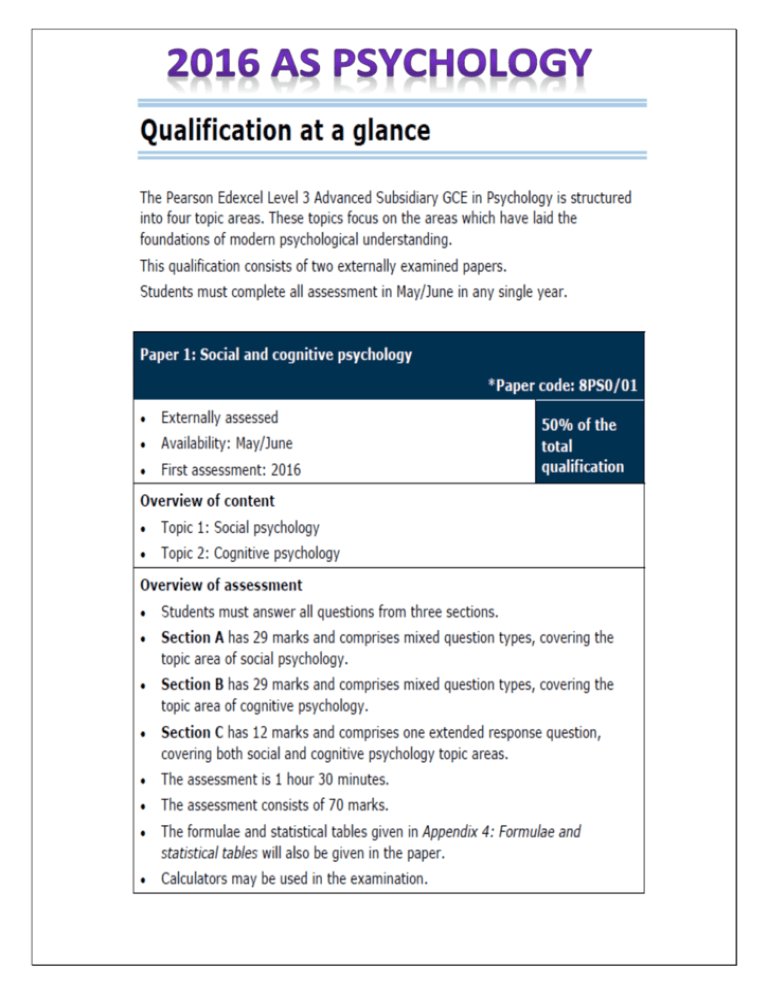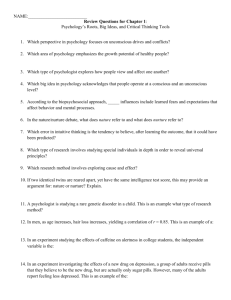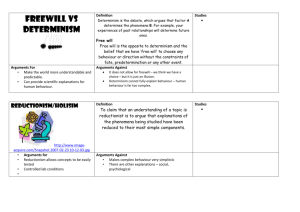2016 as psychology
advertisement

Transferable Skills Cognitive skills ● Non-routine problem solving – expert thinking, metacognition, creativity. ● Systems thinking – decision making and reasoning. ● Critical thinking – definitions of critical thinking are broad and usually involve general cognitive skills such as analysing, synthesising and reasoning skills. ● ICT literacy – access, manage, integrate, evaluate, construct and communicate3. Interpersonal skills ● Communication – active listening, oral communication, written communication, assertive communication and non-verbal communication. ● Relationship-building skills – teamwork, trust, intercultural sensitivity, service orientation, self-presentation, social influence, conflict resolution and negotiation. ● Collaborative problem solving – establishing and maintaining shared understanding, taking appropriate action, establishing and maintaining team organisation. Intrapersonal skills ● Adaptability – ability and willingness to cope with the uncertain, handling work stress, adapting to different personalities, communication styles and cultures, and physical adaptability to various indoor and outdoor work environments. ● Self-management and self-development – ability to work remotely in virtual teams, work autonomously, be selfmotivating and self-monitoring, willing and able to acquire new information and skills related to work. How to link the Extended Project with Psychology The Extended Project enables students to develop transferable skills for progression to higher education and to the workplace, through the exploration of either an area of personal interest or a topic of interest within the psychology qualification content. Through the study of this psychology qualification, students will develop knowledge and understanding of psychological concepts and issues; apply these concepts and issues to real-world contexts; then analyse and evaluate these concepts and issues. Skills developed Through the Extended Project students will develop skills in: ● conducting, organising and using research ● independent reading in the subject area ● planning, project management and time management ● defining a hypothesis to be tested in investigations or developing a design brief ● collecting, handling and interpreting data and evidence ● evaluating arguments and processes, including arguments in favour of alternative interpretations of data and evaluation of experimental methodology ● critical thinking. In the context of the Extended Project, critical thinking refers to the ability to identify and develop arguments for a point of view or hypothesis and to consider and respond to alternative arguments. This supports the development of evaluative skills, through evaluating psychological theories and concepts, and using qualitative and quantitative evidence to support informed judgements relating to psychological issues and debates. The Extended Project is an ideal vehicle to develop the transferrable skills. Types of Extended Project Students may choose a university-style dissertation on any topic which can be researched and argued, for example: ● reductionism in psychology ● using psychology for social control ● the nature-nurture debate. For their dissertation students should use secondary research sources to provide a reasoned defence or a point of view, with consideration of counter arguments. An alternative might be an investigative project or field study involving the collection of data, for example: ● an experiment to look at acoustic similarity of words and the effect on shortterm memory ● an experiment which tests reaction time related to another measure of speed of thinking. Using the Extended Project to support breadth and depth There is no specified material that students are expected to study and, in the Extended Project, students are assessed on the quality of the work they produce and the skills they develop and demonstrate through completing this work. Students can use the Extended Project to demonstrate extension in one or more dimensions: ● deepening understanding: where a student explores a topic in greater depth than in the specification content ● broadening skills: where a student learns a new skill. This might be learning how to design a website or learning a new statistical technique that can be used in the analysis of either primary or secondary data collected by the student ● widening perspectives: where the student’s project spans different subjects. A student studying psychology with other sciences may wish to research the development of psychology from a new to an established scientific field. A student studying psychology with mathematics may wish to use statistical techniques to perform a comparative analysis of data from follow-up studies. A student studying psychology with economics may wish to conduct an experiment that investigates psychological reasons for economic behaviour. A wide range of information to support the delivery and assessment of the Extended Project, including the specification, teacher guidance for all aspects, editable schemes of work and exemplars for all four topics, can be found on our website: www.edexcel.com/project





